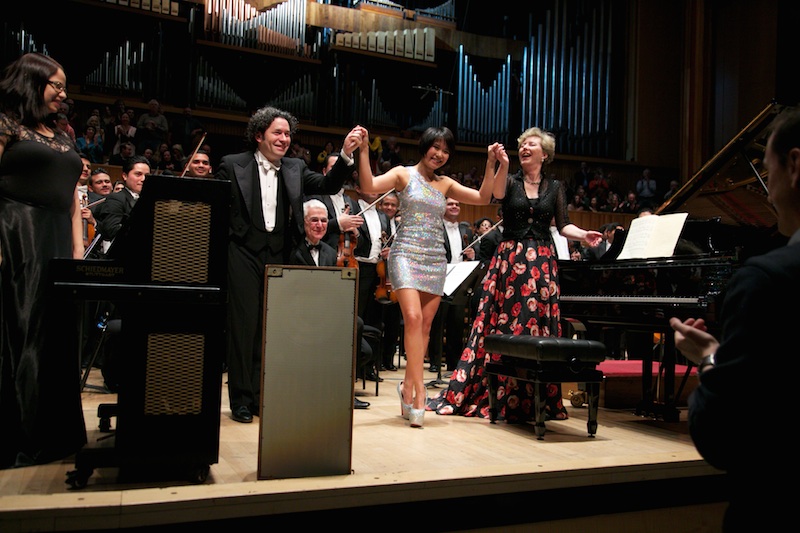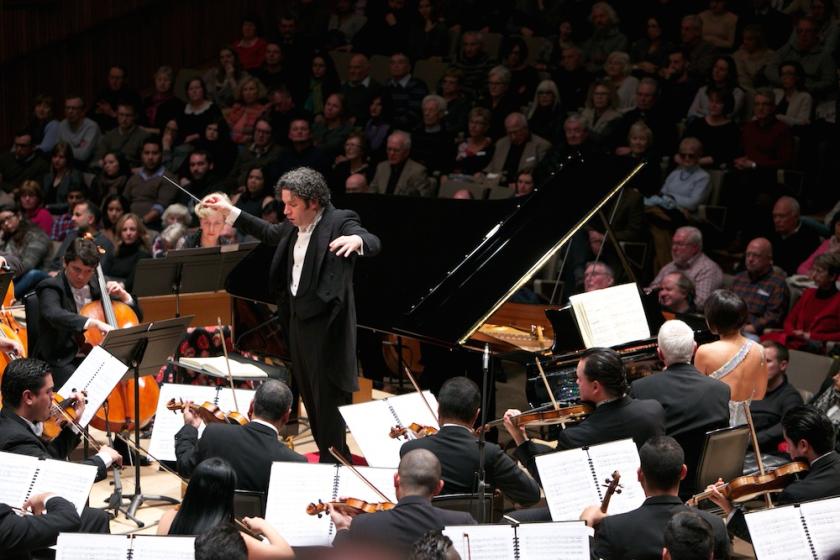Before this concert I had never seen Gustavo Dudamel conduct, and after it I still haven’t. Because of the alignment of my seat and the piano lid, all I saw of the Venezuelan maestro was the occasional glimpse of baton or dark curly hair. So this review will not take account of any podium flamboyance there may or may not have been: my response is purely to the end result. And that end result was good, but short of great.
This was the middle concert of the Simón Bolívar Symphony Orchestra’s residency at the Royal Festival Hall, which started on Thursday with an all-Stravinsky programme. The only item last night was Messiaen’s hefty Turangalîla-symphonie, which clocks in at about 80 minutes. Completed in 1948, and scored for a massive orchestra including piano and ondes martenot, the symphony is not heard that often – although I saw it last only a few months ago at the 2015 Proms.
Wang’s playing was as glittering as her clothing
On that occasion, the Royal Albert Hall’s acoustic had the effect of blunting the piano, which was largely overwhelmed. Here the Festival Hall sucked life out of the orchestral sound, allowing the piano to take centre stage. In fact, the piece felt like a giant piano concerto in a way that had not struck me before, such was the focus on pianist Yuja Wang.
She was resplendent in a glittering silver mini-dress and matching shoes with extraordinary heels, which I only mention as they must have made pedalling a physical challenge. Wang’s playing was as glittering as her clothing. It was not subtle, for the most part, but subtlety is rarely demanded in this piece. She was athletic in the frequent cadenza-like runs up and down the piano, playing with a bright, brittle tone. Only the sultry sixth movement makes different demands of the pianist, and here Wang found a nice mix of languor and rhythmic perkiness, although some of her articulation was a bit mannered.
With most symphonies it would be a big problem if things did not really kick into life until the fourth movement, but in the case of Turangalîla that still leaves plenty to come. The first three felt distinctly half-hearted and underpowered, and it was not until the big climax in the fourth movement, the second “Chant d’amour”, that the performance really took flight.
The wild dances of the fifth and tenth movements were high points, where the orchestra revelled in the frenetic exchanges between strings and winds. These were genuinely joyous passages, the Finale beginning with rhythms reminiscent of Leonard Bernstein, who as conductor led the premiere of Turangalîla. Other parts were a bit less impressive; the “Jardin du sommeil d’amour” was marred by a too-prominent vibraphone, and the hocket in the seventh movement lacked precision.
 Throughout, the orchestra seemed to be battling the acoustic. An extrovert piece like this really requires something more generous, where detail is less important than the overall wash of sound. That said, the ondes martenot was well balanced with the orchestra; hearing too much of it can be like an over-sweet dessert, but in the capable hands of Cynthia Millar (pictured above with Dudamel and Yuja Wang) it coloured the textures without dominating them.
Throughout, the orchestra seemed to be battling the acoustic. An extrovert piece like this really requires something more generous, where detail is less important than the overall wash of sound. That said, the ondes martenot was well balanced with the orchestra; hearing too much of it can be like an over-sweet dessert, but in the capable hands of Cynthia Millar (pictured above with Dudamel and Yuja Wang) it coloured the textures without dominating them.
The Turangalîla-symphonie is a voluptuous celebration of eroticism and needs to be played with complete abandon. Dudamel controlled things tightly – and such a showpiece is firmly his kind of material – but only in the final minutes did this performance rise above the merely saucy to achieve a real sense of uncontrollable passion. Epic Hollywood harmonies and modernist scrunches competed against each other for supremacy. Dudamel milked the final chord for everything it had to give, and duly got his standing ovation, but left me wishing the whole thing had scaled the heights that were achieved only in patches.
- The Simón Bolívar Symphony Orchestra residency concludes tonight
@bernardlhughes














Add comment